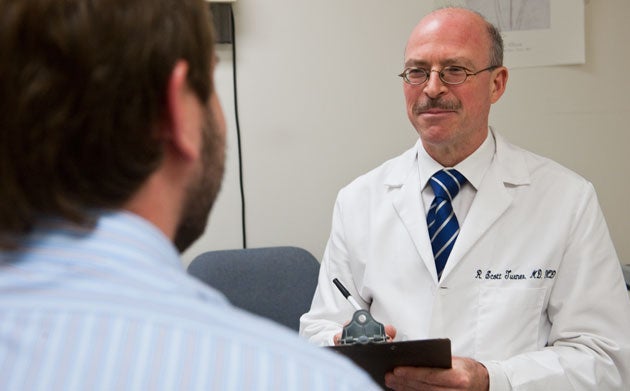Title: Georgetown Leads National Resveratrol Study for Alzheimer’s Disease
A national, phase II clinical trial examining the effects of resveratrol on individuals with mild to moderate dementia from Alzheimer’s disease is being led by Georgetown’s Dr. R. Scott Turner.

Turner, director of Georgetown University Medical Center’s Memory Disorders Program, is the lead investigator for the national study, for which more than two dozen academic institutions will recruit volunteers in the coming months.
Resveratrol is a compound found in red grapes, red grape juice, red wine, chocolate, tomatoes and peanuts. Pre-clinical and pilot clinical research studies have suggested that resveratrol may prevent diabetes and act as a natural cancer fighter.
Such research has also suggested the compound could ward off cardiovascular disease and memory loss, but there has been no large definitive study of any of these effects in humans.
Testing Memory
“Most resveratrol studies showing any health benefits have been conducted in animal models, such as mice, and with doses that far exceed intake from sipping wine or nibbling on chocolate,” Turner says. “With this clinical trial, we’ll find out if daily doses of pure resveratrol can delay or alter memory deterioration and daily functioning in people with mild to moderate dementia due to Alzheimer’s.”
The research is sponsored by the Alzheimer’s Disease Cooperative Study (ADCS), through a grant from the National Institute on Aging (NIA).
Age increases the risk of diseases such as Alzheimer’s and diabetes, and animal studies have suggested that resveratrol may impede the molecular mechanisms of aging.
Diabetes Check
Human population studies suggest there are health benefits from modest daily consumption of red wine, but the mechanisms of action in the body are unknown.
“During this study, we will also test whether resveratrol improves glucose and insulin metabolism in older individuals,” Turner explains, “although those who already have diabetes will not be included.”
The U.S. Food and Drug Administration has not approved resveratrol for the treatment of Alzheimer’s, and it is not yet known if resveratrol can change the course of the disease.
Resveratrol vs. Placebo
Not everyone who enrolls in the study will receive resveratrol. Half of the participants will receive a placebo (a sugar pill that looks like resveratrol).
Neither the patient nor the clinical staff will know if the study participant is receiving the placebo or resveratrol until the end of the study.
“This is the gold-standard for conducting a clinical study because it allows us to objectively determine if resveratrol is offering any benefits,” explains Brigid Reynolds, a nurse practitioner and lead investigator for the study at Georgetown.
Tolerance Question
The phase II study also will examine the safety and tolerability of resveratrol administered twice daily with a dose increase planned at three-month intervals, she says.
According to the National Institute of Aging, more than 5.3 million people in the U.S. are suffering from Alzheimer’s, and every 70 seconds, another person develops the disease.
In Washington, D.C., more than 9,000 people aged 65 and older are currently living with Alzheimer’s.
Participation Facts
The resveratrol study will be conducted at 26 U.S. academic institutions affiliated with the Alzheimer’s Disease Cooperative Study.
To learn more about the resveratrol study or other Alzheimer’s studies underway at Georgetown, contact Kelly Behan in the GUMC Memory Disorders Program by calling (202) 687-0413 or by emailing her at keb53@georgetown.edu.
Information is also available at memory.georgetown.edu. Georgetown study participants must speak English.